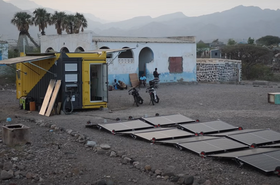French energy-tech startup Hestiia is set to launch a radiator that uses the excess energy generated by computing power to heat homes.
The heater uses recycled ASIC chips, harvested from data centers upgrading to newer models, placing them on a custom-made board. When these chips are harnessed for their compute power and start to generate heat, conductive layers and heat pipes inside the device transfer that heat out into the home.
The calculations performed by the heater, dubbed MyEko, will reportedly be used by technology companies that need computing power for workloads such as 3D modeling, scientific research, AI, blockchain, and crypto mining.
Hestiia claims that MyEko allows for 40 percent energy savings compared to traditional radiators and the company reimburses device owners for 18 percent of their heating bills in exchange for the computing calculations they allow the device to run. Each unit costs €990 ($1,086) and will be available to ship in September 2024.
Founded as WiseElement in 2013 by two engineers, Hestiia launched a boiler called SATO that heated up via compute power in 2021. That same year, the company embarked on a €1.2 million ($1.3m) funding round, raising a further €1.3m ($1.4m) in 2022.
Hestiia is not the first company to try heating home with the waste energy generated by compute processing. Another French company called Qarnot raised €35 million ($38m) in January 2023 to expand the production of their digital boilers that heat water using waste heat from servers installed on-site. Qarnot was founded in 2010 and has been offering this service since 2015.
That same month, cloud service provider Civo announced it was partnering with Heata to provide hot water to UK homes via heat from on-site servers connected to domestic heating systems. Civo also joined forces with Deep Green last year to provide cloud services on data centers that heat swimming pools.
Not every company that has attempted to bring this alternative heating method to the masses has seen success, however. Other companies that have now exited the field include Germany's Cloud&Heat, which now offers efficient Edge data centers instead of digital boilers; Dutch startup Nerdalize, and New York-based Exergy.






